Month: August 2019
On Retreat: Pathfinding
Seth Ratzlaff is a writer based in Kitchener, Ontario, and he was one of two writers to win the Young Writers Bursary to the 7th annual Write on the French River Creative Writing Retreat, at the Lodge at Pine Cove, in northern Ontario. The bursary was founded by the Class of 2018 to support and encourage writers under 35. Seth’s mentor/instructor for the week was the inimitable Andrew Westoll.
Seth’s project, at the retreat, was a collaborative life story project he is writing with Indigenous activist Clarence Cachagee. Clarence’s “Mornings,” from their manuscript North Wind Man, appeared in TNQ 150, spring 2019, in our Soundings series.
–2019 retreat director, Susan Scott
In northern stillness, our canoe drifted beside the nearly submerged beaver lodge. Steam slowly rose from its top, the combined exhales of a family curled up inside. They were no doubt carefully listening to us uninvited guests, loitering beside the stick-and-mud walls of their home.
It’s one of those moments that instantly called for a description, before you have even taken in the scene for yourself. I’m sometimes uneasy slipping into that spectator view of the world, more concerned with the perfect metaphor than actually being totally present. But when you’re on a retreat with a bunch of writers, you can’t help but think about words, motivated by everyone else’s dedication to the craft—and their skill.
This was the second day of the writing retreat. My roommate, Steve, and I had risen early for the short canoe trip. One of the Lodge’s directors had driven us and two others to a small bay. From there it was a short paddle to a forest flooded with high waters, where we encountered the beaver lodge.
Steve and I were in the canoe together, quietly listening to the crow calls above, imagining life in this shelter below.
I met Steve soon after arriving at the Lodge, when I was brought to our cottage after checking in. He was a tall, slim man with long grey hair. I knew we would get along when he confessed that he liked to really explore the meaning of specific words, giving examples such as individuation, synchronicity, and love. By breakfast the next morning, we were working at the kitchen table together, sharing about our paths on life’s way, drinking coffee and listening to the sounds of the French River through the cottage’s screened windows.
Paddling back to the Lodge, I tried to appreciate my surroundings wordlessly. But my thoughts returned to that beaver family, crammed into the highest point of their home by unusually high water levels. Was it an omen?
Our paths on life’s way, it turned out, formed a surprising symmetry. He was entering a stage of solitude, his two daughters having moved out recently, into their own independent lives. Steve’s life as it had been for the past thirty-some-odd years was, for all intents and purposes, over. Transitioning out of their well-practiced roles, he and his wife had decided to take some time apart from one another, to find themselves again after nearly a lifetime together.
“Individuation,” he said.
I, on the other hand, was situated at the beginning of Steve’s path, preparing to get engaged and thinking about soon starting a family of my own. All of this, I confess, has been no easy thing for me to ponder (fear and trembling, etc.). The funny thing was: we were both worried about similar questions. Who will I become after this? What lies ahead?
When I pointed out the mirroring of our situations, Steve smiled.
“Synchronicity,” he said.
Paddling back to the Lodge, I tried to appreciate my surroundings wordlessly. But my thoughts returned to that beaver family, crammed into the highest point of their home by unusually high water levels. Was it an omen? As Steve steered the canoe, I was no longer present, thinking once again about words I needed to explore.


Header photo courtesy of James Walsh. For more information about James see www.sinamatella.com.
The 2019 Peter Hinchcliffe Short Fiction Award Winners
We are pleased to announce the 2019 Peter Hinchcliffe Short Fiction Award winners!
2019 Peter Hinchcliffe Short Fiction Award Winners
Winning Story:
♦ “The Underside of a Wing” by Paola Ferrante
Second Prize:
♦ “Amphibios” by Andrea L. Mozarowski
Honourable Mentions:
♦ “After Walter” by Chris Masterman
♦ “This is About Running in Jerusalem” by Sivan Slapak
♦ “He of the Holy Birth” by Jennifer Batler
♦ “Touched” by Anna Marie Larson
I am Afraid of Everything: Pine Cove 2019
Nicole Smith was one of two recipients of the retreat’s Young Writers Bursary, founded specifically to support writers who would not otherwise have had the means to attend the 6-day intensive, Write on the French River Creative Writing Retreat at the glorious Lodge at Pine Cove, in northern Ontario. Nicole joined 20+ participants, instructors Helen Humphreys, Alison Pick, and Andrew Westoll, and resident editors Pamela Mulloy and yours truly for a week of—well, I’ll let her tell the story. Nicole’s mentor & instructor for the week was the incomparable Helen Humphreys.
–2019 retreat director, Susan Scott
I am afraid of everything. That is the truest truth about me. I am afraid of everything. Of night, plus also morning. New experiences plus old ones. Getting lost, being found, eating onions, bleeding. Being too much, being too little, getting married, contracting meningitis. I am afraid of heights, needles, planes, not putting myself out there, stretching myself too thin. Becoming morbidly obese. Holding my breath too long, halitosis, stepping on a nail, stepping on a snail, timbits. Someone once told me “timbits are the holes of donuts,” and I’m sorry, but no, nope, never. Absolutely not.
I spend a lot of time in my bathtub, where it is safe.
I do take chances, but only on things I probably won’t ever have to follow through on. Like winning the lottery. I will always buy a lottery ticket. I will never answer my telephone.
As a long-time fangirl of The New Quarterly, long before our glorious 6 days at The Lodge at Pine Cove, I knew all about Write on the French River Creative Writing Retreat. I knew all about it, because I’d looked at it longingly many-a-time, from afar. As a new, full-time writer-of-things, the week was outside my price range, but I’d dreamt every year of attending, while also imagining the type of human I might be if I was not so broke and afraid. Unfortunately, that type of human always has a dog, and I am afraid of dogs.
This year, sandwiched between the description of the beautiful cottages, workshops with prolific Canadian writers and editors, and daily hand-delivered breakfast basket, I read about a bursary for a writer under 35. A new opportunity, thanks to participants from the previous year, who had pitched in to raise funds for a bursary, to encourage young people to apply. (Two bursaries, as it turned out.) Heart racing, I immediately applied, confident in the knowledge that I would never actually have to go. Placing my grateful heart and instant coffee on the rim of my tub, I pressed submit and leaned back into the warm water, happy with all of the hard work and bravery I’d exhibited for the day.
“Nicole,” Susan Scott wrote back a couple weeks later. “Congratulations! You are a recipient of our inaugural bursary!”
Hands shaking, I dropped my phone in the tub.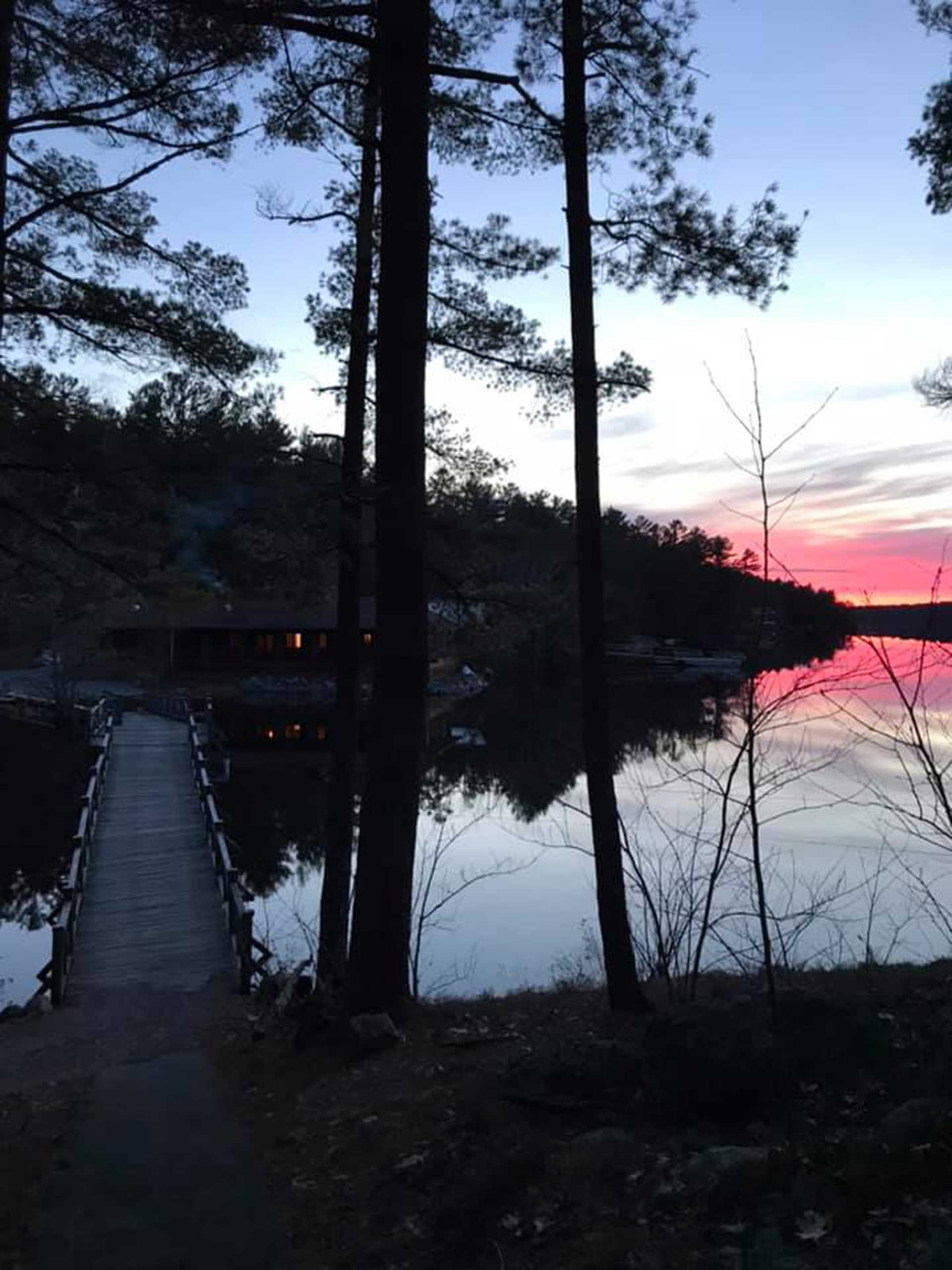
“No—” I gasped.
“…yes!” She replied. “Hurray!”
“Is it really true?”
I am afraid of lies.
“It’s really true!” Susan assured me.
But I am afraid of truths, so I poured my coffee on my head and drank the lavender bubble bath. Lavender is good for anxiety.
I am afraid of isolation, plus also too many people. I am afraid of bears. I am afraid of being murdered, and Pine Cove would be the perfect spot for that, which I was sure to mention to everyone while introducing myself. I am afraid of being afraid, especially alone and afraid, so sometimes I try to make others afraid too. I know it’s mean, but I am afraid of being too nice.
At Pine Cove, others were not afraid when I mentioned murder. They laughed, actually. Margaret, whom I loved immediately because her introduction was I’m here for the breakfast basket, said: “No worries, babe. I have LOTS of pent-up aggression. If there’s a murderer, you just call my name. I’ll take care of it.” And then everyone laughed some more, and I relaxed, until I became afraid of Margaret.
When I pulled up to the Lodge, I was the first one there, because I am afraid of being late. I am afraid of being early, too, because when you’re early, you have to choose your bedroom, and all of them were impossibly gorgeous and spacious and built around a king-sized bed.
I am afraid of packing too little, so I packed too much. But I am afraid of waste, so I worked very hard to use everything I packed, including all of the wine.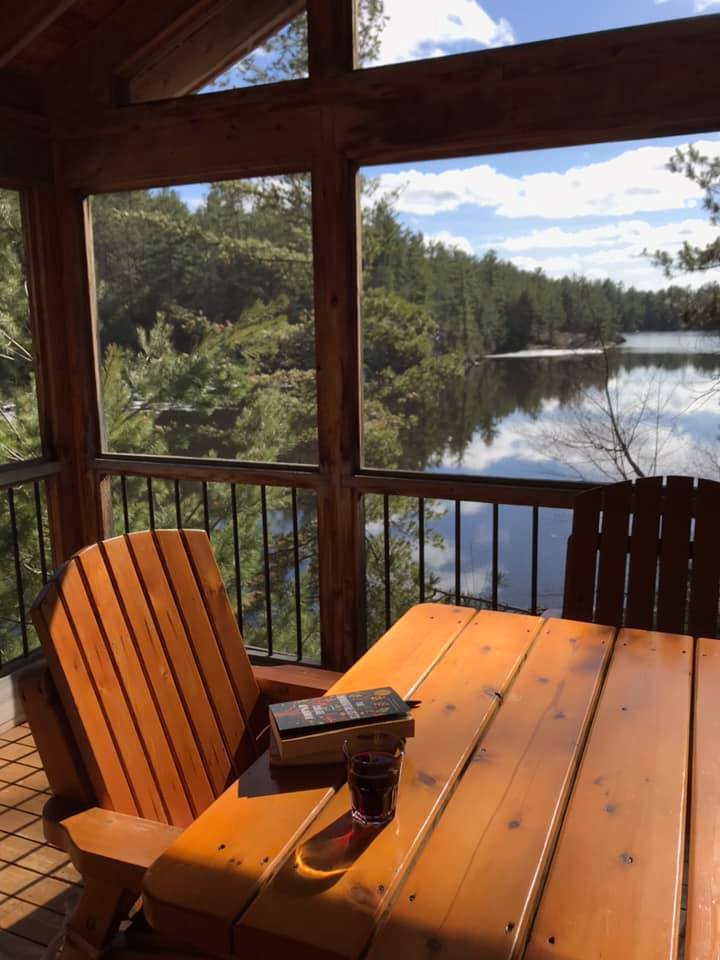
That first day, I waited atop my yoga mat (my portable bathtub, portable safe space), after deciding on the first bedroom in the hallway. The room closest to the exit. I waited in the living room for my roommates to arrive, which overlooked the beautiful cove, which was blurry to me. I couldn’t quite see it at first – the beauty – even though I was staring straight at it as Maureen came through the door, holding her wine and yoga mat, beaming.
“Hello!” She said. “Hey, this’ll work!”
We gabbed until our third roommate arrived, at which point we stopped talking and listened instead. Sandy had the most fascinating stories to Cher. I say Cher because Sandy knew Cher (as in Cher) once upon a time. Upon learning this, I asked if we could facetime Cher, which was not an option.
Instead, we opened more wine.
We chatted about trusting our intuition.
“Yes. You HAVE to believe,” I said in a very Shiraz-specific way.
“It’s more than just believing, though.” Sandy said to me. “It’s knowing. Trusting your gut is a Knowledge.”
I took what she said about my gut to heart, even though I am afraid of all my body parts, and then asked: “But do you believe in life after love?” and she still spoke to me after that, which is a testament to her character.
I am afraid of Helen Humphreys, because I am afraid of all brilliant people, especially when they are funny and generous.
“Are you going to give me some of your writing to read?” Helen asked after our first group meeting. I had signed up to work with Helen, but here I was, looking the other way when she made her offer.
“YES I WANT THAT,” I’d wanted to scream, “BUT I AM SO AFRAID.”
Now we were outside, cell signals floating down the French River, the smell of burning woodstove and gourmet turkey sandwiches lingering in the air.
“I was just heading to my car—” I said. “Just for a little drive, I think. Not to escape. Not to run all the way home, screaming.”
Helen smiled. “I liked your writing sample.”
“Oh…” I said. “I like your dog.”
Helen Humphreys is (of course) the type of human who has a dog.
“I’m here, is all,” she offered, turning back towards her cottage. “Use me as a resource.”
“Okay,” I agreed. “But not today.”
Helen chuckled. “I think I’ll go for a drive later, too.”
And then, as if under a spell, everything in front of me began to sharpen.
The grass became greener. The sun became brighter. Suddenly I wanted to try a timbit. I didn’t, and I never will, but I wanted to.
What I realized in that very moment was 1. Helen Humphreys could be a witch, and 2. my surroundings weren’t blurry at all. I was just standing too close to them. Even from hundreds of experiences away.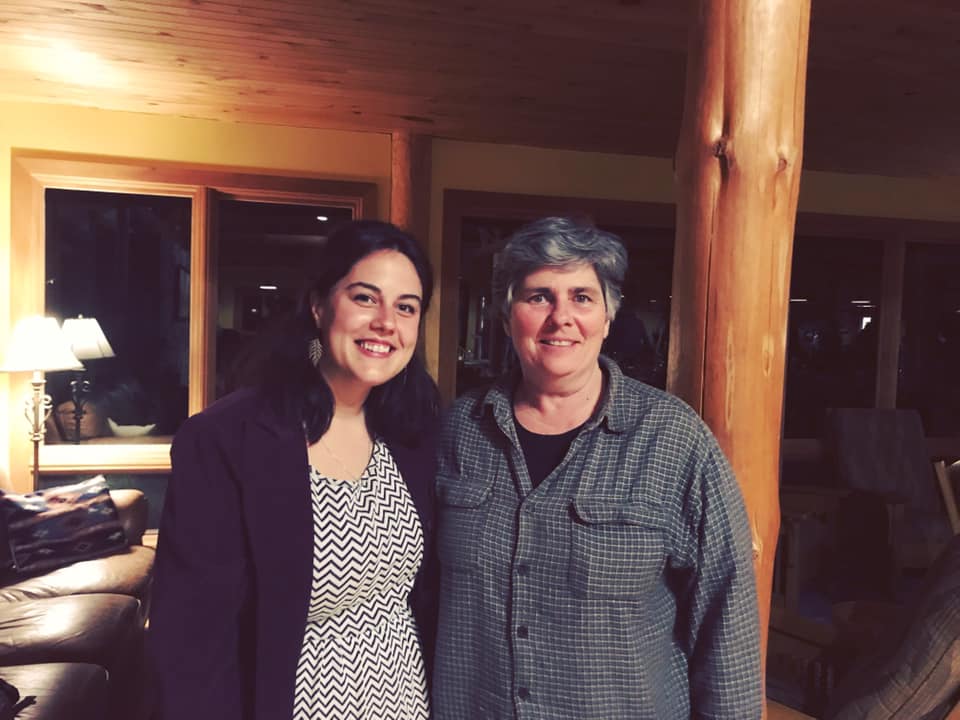
I am afraid of realizations, because I am afraid of being too hard on myself, plus also not hard enough. But when we need glasses, we don’t hate the book. We don’t even hate ourselves. We just put something clear between us and the rest of the world. Space. Distance. Style, even. Helen allowed me all of my uncertainty, and then all at once, I focused. In a way I haven’t in maybe ever. Not in my adult life, anyway. As soon as I did, I could see that everyone was allowing everyone else the same. Curiosity. Inquisitiveness. Objectivity. Here, we just existed. As whoever we were and are. Because we had room to do it, time that was ours alone, and Crème Brulé served to us in little individual dishes every night.
I spent every next second writing. I had things to say almost immediately. I glanced back up at Helen. She was all the way across the bridge, and I could still see the pattern on her shirt. Seth Ratzlaff, who won the second bursary, stepped outside and stood beside me. We both rubbed our eyes.
“Is this really real?” I said.
“I know,” he said. “I don’t know.”
I ran back to my cottage and took a bath just for fun, and when a spider fell from the ceiling and landed on my phone, I waited a whole second before whipping it across the room, cracking my screen.
Helen read all of my writing. We had a number of meetings over the course of the week, plus a world of rich and enlightening group discussions. Our group consisted of eight women, each of whom inspired me deeply.
Evidently, Breakfast Basket Margaret came for a lot more than the croissants, because she worked nonstop the whole retreat and churned out something dazzling. Other Margaret (we had two of them in our group) made me laugh every day. She made fun of exactly all of my Elizabeth Gilbert quotes, which was refreshing. Deb and Ali and I have decided to start a writer’s group, and Charlotte was from Warsaw, Ontario, which I now know is a place. Helen read every piece of work we brought her. She gave an outrageous amount of time and energy to each of us. On our final day at Pine Cove, Laura and I sat together on the couch. She was working through a phobia of her own.
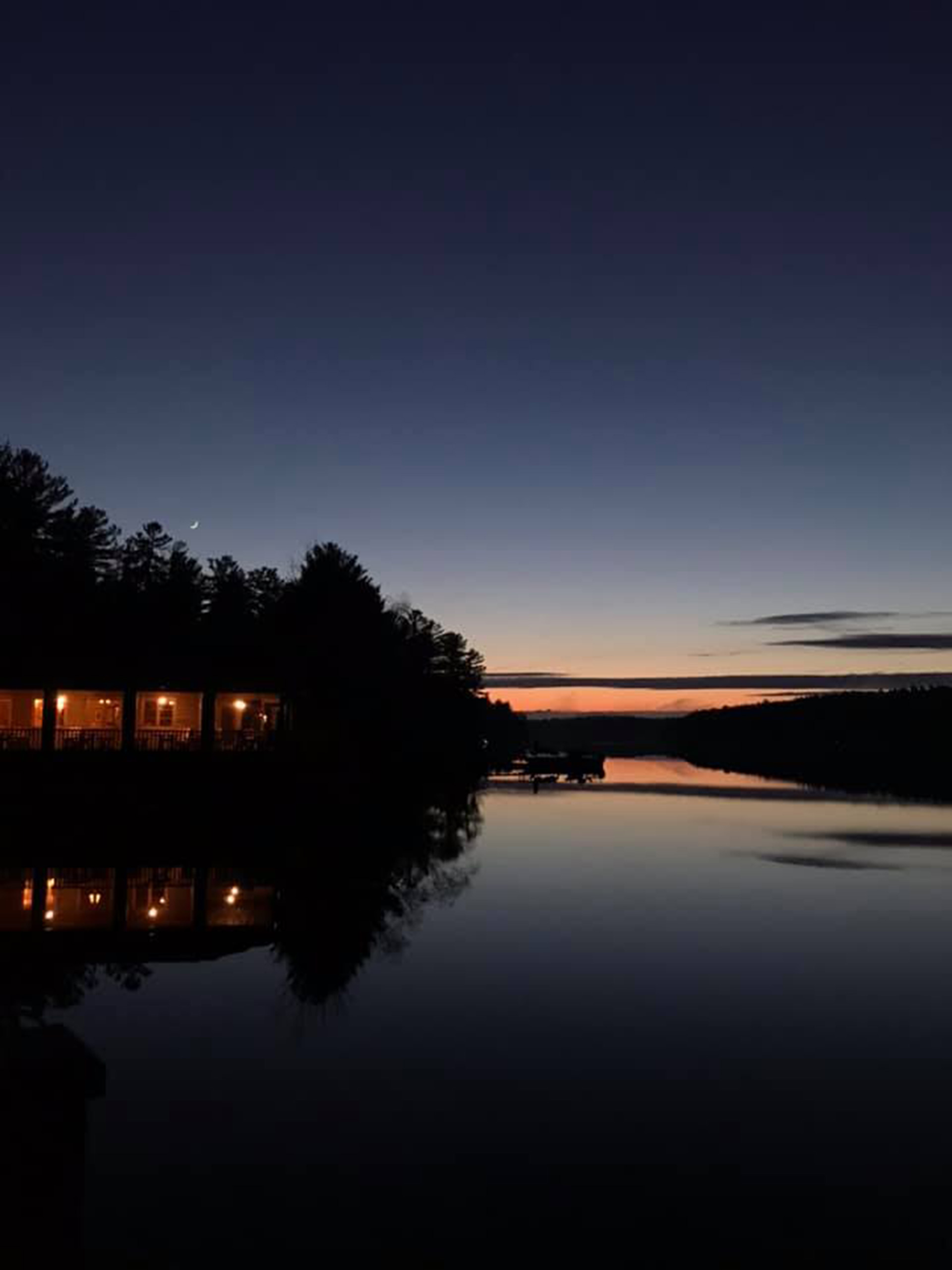 We shared eye contact with the Canadian Shield, finally growing used to the natural kind of safety it provided. She said to me, exhausted in a way I know all too well—
We shared eye contact with the Canadian Shield, finally growing used to the natural kind of safety it provided. She said to me, exhausted in a way I know all too well—
“Are you afraid of anything?”
And all I could do was laugh, because I was too afraid to cry, which we both did when we hugged goodbye a few hours later.
As I drove away from the Lodge, I think it was Laura but it could have been me who said: “thank you,” and on my way home, I stopped for a timbit in Port Severn, and I promised to never forget all of the transformative things I learned in our 6 magical days on the French River. Days I will hold onto for a lifetime. Touchstone days. Days I would not have had if not for the generous souls who saw fit, or the magnificent instructors and organizers who lent what they already know to each of us, or everyone who stepped out of their own worlds and comfort zones to retreat. It is so scary to be vulnerable, I thought. This is the true beginning of my vocation, I thought.
And then I remembered the term “donut hole” and spit the timbit out in my hand, because no. Nope. Never. Absolutely not.
Photos courtesy of Nicole Leona Smith.
Header photo courtesy of James Walsh. For more information about James see www.sinamatella.com.
Nick Blatchford Occasional Verse Contest Winners
We are pleased to announce the winners of the 2019 Nick Blatchford Occasional Verse Contest!
2019 Nick Blatchford Occasional Verse Contest Winners
Winning Poem:
♦ “Tender is the Night” by Terence Young
Second Prize:
♦ “The Kindness of Port Angeles, 2002” by Deb O’Rourke
Third Prize:
♦ “First knock down” by Sarah Yi-Mei Tsiang
♦ “Transmission Tower” by Rob Taylor
♦ “Comrade Birds” by Frances Boyle
Honourable Mentions:
♦ “After the Wake” by Beth Downey
♦ “Letter to Whiskey” by Susan Vernon
♦ “Takotsubo Cardiomyopathy/Broken Heart Syndrome” by Laurie Koensgen
♦ “Shikata ga nai” by Lorin Jane Medley
♦ “In Winter” by Eleanor Sudak
♦ “Prologue to a Bliss State” by Lisa Martin
♦ “The Commons” by Rob Taylor
What is Ami Sands Brodoff Reading?
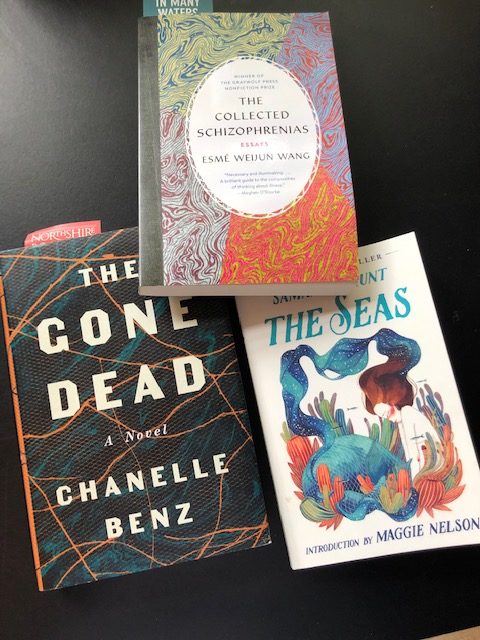 I usually have a few books on the go and fiction is my passion reading. Right now, I’m engrossed in two contemporary novels: The Seas, by Samantha Hunt and The Gone Dead, by Chanelle Benz. I learned about The Seas on a recent rainy day in Vermont while browsing in a lovely independent bookshop, The Northshire. The Seas was among the staff picks with a personal handwritten note by the bookseller who recommended it. I admit I was also drawn to its striking, colourful, and fantastical cover, as well as to the reviews and blurbs. The Seas is hard to classify. The novels pushes the boundaries between fiction and fantasy, myth and reality. It is spare yet gorgeously written in lyrical prose and can be subversive and funny. It’s a tale about a lovelorn girl who may be a mermaid flooded with aqueous themes and enthrallment with the ocean. Anything with water and you have me at hello.
I usually have a few books on the go and fiction is my passion reading. Right now, I’m engrossed in two contemporary novels: The Seas, by Samantha Hunt and The Gone Dead, by Chanelle Benz. I learned about The Seas on a recent rainy day in Vermont while browsing in a lovely independent bookshop, The Northshire. The Seas was among the staff picks with a personal handwritten note by the bookseller who recommended it. I admit I was also drawn to its striking, colourful, and fantastical cover, as well as to the reviews and blurbs. The Seas is hard to classify. The novels pushes the boundaries between fiction and fantasy, myth and reality. It is spare yet gorgeously written in lyrical prose and can be subversive and funny. It’s a tale about a lovelorn girl who may be a mermaid flooded with aqueous themes and enthrallment with the ocean. Anything with water and you have me at hello.
I’m also into The Gone Dead, a can’t put down debut novel. Set in Mississippi, the story centres on Billie James who inherits a shack in the Delta that belonged to her father who died unexpectedly and mysteriously when she was four years old. Her neighbors are a family whose history has been enmeshed with hers since the days of slavery. The story contains varied voices which form a chorus around Billie’s primary voice. Suspenseful and gritty, this novel offers a fresh look at Mississippi’s dark past.
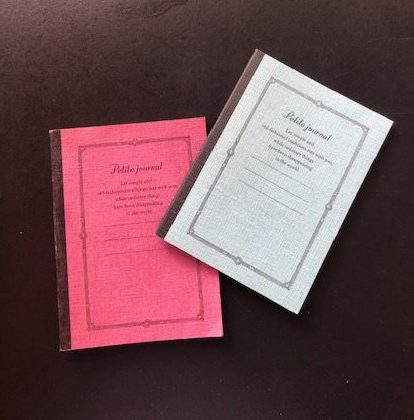 In addition, I’ve loaded Toni Morrison’s oeuvre onto my ipad and plan to revisit this literary lioness’ work in full, especially now that there will be no more Morrison to come.
In addition, I’ve loaded Toni Morrison’s oeuvre onto my ipad and plan to revisit this literary lioness’ work in full, especially now that there will be no more Morrison to come.
I’m also dipping into an extraordinary nonfiction work, The Collected Schizophrenias, essays by Esme Weijun Wang, a raw and powerful first-hand account of navigating psychosis. These pieces will make you question what it means to be well and what it means to be ill.
I keep up with book news and reviews and keep lists of books I want to read in little notebooks I carry with me, so I don’t forget their titles or authors. I read both on paper and ipad or Kindle. The latter is portable and great for travel, having a library in one place. The former can’t be beat for the sensuous pleasures of heft, of turning a page, of finding and rereading an extraordinary passage. But I realize the greatest gift of reading a cloth-bound or paperback book is the concentrated focused attention that it enables. I put my devices away and read.
I begin my day with a bit of reading in bed over coffee and I end my day with more reading in bed over mint tea. After I knock off work on my own writing, I will often do some reading.
I also love audible books, especially when my eyes are strained. I’ll sit out in the park or a café and listen. It takes concentration and is a more drawn out enveloping experience than reading, as many more hours are required to finish a book.
The old me felt forced to finish a book I’d started no matter how bored or frustrated I felt. The new me will give a book about fifty pages, and if it does not engage me, I will put it aside with no Jewish guilt. Life is too short.
I savour a dramatic story with lies and secrets and mysteries to unravel. Attention to language is vital as is layered complicated characters. In short: I want it all.
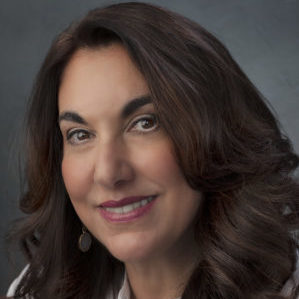
Ami Sands Brodoff is an award-winning novelist and short story writer based in Montreal. She is at work on a new linked collection, The Sleep of Apples.
Photos courtesy of Ami Sands Brodoff.
Header photo by freestocks.org on Unsplash
What is Rebekah Skochinski Reading?
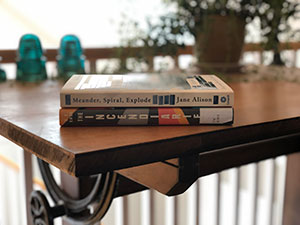 I have a confession: I’m not in a monogamous relationship… with books. I read everything—often simultaneously: fiction, non-fiction, poetry, piles of literary journals, and I have a zillion tabs open on my computer.
I have a confession: I’m not in a monogamous relationship… with books. I read everything—often simultaneously: fiction, non-fiction, poetry, piles of literary journals, and I have a zillion tabs open on my computer.
I walk to the library several times a week (the librarians at the Thunder Bay Public Library know all of my secrets) and I try to buy books as often as I can. Recently, I read Bunny by Mona Awad, which is a delight: dark, funny, and twisted, in the best possible way. And I also really enjoyed Taffy Brodesser-Akner’s Fleishman is in Trouble. Having read and admired the celebrity profiles she’s written, and as someone who also writes a lot of non-fiction (I’m the assistant editor of The Walleye—an arts & culture magazine), I was excited to see her foray into fiction. It blew me away. If there were a Temple of Taffy, I would worship.
Currently I’m reading R.O. Kwon’s The Incendiaries. Kwon and I share a similar history in that I also left organized religion many years ago. She’s been vocal about the grief and sense of loss that comes with that, which I can relate to, so I’m eager to get inside the heads of her characters—I’m drawn to any story that has a spiritual component to it.
“I really admire people who can plan out their entire project. I always have to sneak up on it sideways.”
I’m also reading Meander, Spiral, Explode: Design and Pattern in Narrative by Jane Alison, which looks at the connections of patterns found in nature. I grew up in a small rural community and spent a lot of time walking through fields and down dirt roads, climbing trees, and swimming in rivers. Since I’m working on the first draft of a novel, I’m hoping it will help me shape it in a way that speaks to my wandering mind. I really admire people who can plan out their entire project. I always have to sneak up on it sideways.
And, what I read every day without fail is a blog: laineygossip.com. I’ve been a faithful reader for over a decade. I love it for the pop culture, fashion, and the Show Your Work podcast, but I’m also there for the gossip. Gossip allows me to figure out what motivates people. What they try to hide and what they choose to reveal. It’s easy to have confirmation bias when it comes to reading: we read what we think we will like. So if I’m learning about someone or a situation that is so far removed from myself and my life, I’m forced to consider where they’re coming from in real time. In that way, I could probably argue, it has made me a better writer. And it’s a major reason I read.
I’m looking forward to digging into new fiction by Cherie Dimaline and Emily St. John Mandel, but I also want to re-read everything by Toni Morrison. Oh, and I just won a book by filling out an online literary matchmaking quiz from Kerry Clare of picklemethis.com. Who doesn’t love getting books in the mail?
I’ll read anywhere: in my backyard, at the doctor’s office, on the couch. When I was a kid, I stayed up well past my bedtime with a housecoat slung over the lamp and a towel wedged under the door so my parents thought I was asleep. Now, if I try to read for any length of time in bed, the only thing that I’m reading are my eyelids. So I get up early and read in the morning. It feels like stolen time. At night is when I sift through my stack of The New Yorker’s and literary journals on my nightstand including the latest issues of Grain, Room, Prairie Fire, The Malahat Review, and The New Quarterly.
Reading saves me from myself. You know how in Scrabble when you decide to exchange your letters so that you can start fresh? Every time I read a book, it gets me out of my head—I feel like I’ve been given a new set of letters and I know how to make words again.
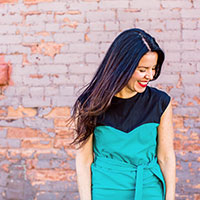
Rebekah Skochinski has been published in various literary journals and recognized in contests both in Canada and the United States. She is working on a collection of short fiction and a novel.
Photos courtesy of Rebekah Skochinski.
Kirsteen MacLeod’s Writing Space
I have a problem for a writer: I hate to sit down for extended periods. It wasn’t always thus, but right now I feel restless, compelled to roam, to seek writing spaces in all corners at home, or outside by the woods or the water, or in public libraries, those treasure-filled temples without which I’d never, ever have become a writer.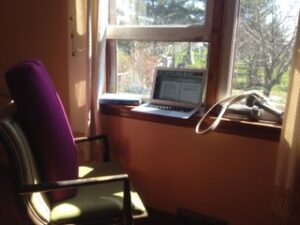
When I’m home I might perch the computer on the windowsill in my small yoga studio, seeking ways to make writing a dynamic activity. I’m fond of the view from this window, which includes a cherry tree, a chicken coop with five fluffy birds, and beyond the backyard, a cemetery – an “If not now, then when?” to imbue my days.
When I feel the need for a safe underground writing bunker, which happens more and more in these anxiety-provoking times, I work in my basement study. It features a movable desk that goes from low—sitting cross-legged on the floor—to medium—sitting on an exercise ball or a chair—to standing height. Beside the desk a treadmill collects dust. When I go down there, I set a timer for one hour—upstairs, so I have to run and turn the infernal thing off. This prevents me from losing track of four hours, spine in a C position, not breathing, concentrating hard, which happens regularly despite how much I loathe sitting still and all the yoga I do to remind me to breathe and be conscious of my body.
When I feel most sensitive or beleaguered, I take my rat’s nest of papers and books and write under the duvet of my bed awhile, propping myself up on the pillows.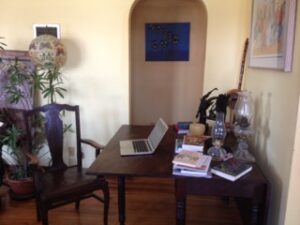
In brighter times, when the sun is in the west, I write at the front of the house at the kitchen table, a centrifugal mess of papers, books, pens and sticky notes spinning out from my computer. Or I open the front door to let in the light and fold out the cherry leaf of the antique hall table. This blocks the path to the hallway, impeding the progress of others, who look significantly from me to the wall-sized bookshelf in the living room. Like my study the shelf was lovingly built for me with hopes of containing my workspace sprawl. Whichever place, I also pace.
I’m often driven offsite by noise. It’s a myth that living by a cemetery is quiet: the dead require constant lawn care. When mowers drone and leaf-blowers belch I go to write up to the conservation area five minutes’ drive north of my house. I park in front of the reservoir and go for a walk, and then work in the passenger seat of my car, glancing up to see the odd swan, duck or heron take off or land, or I go sit in the window of the Outdoor Centre, saluting the stuffed owls and taxidermied fisher on my way in. And there’s always my cabin by the river.
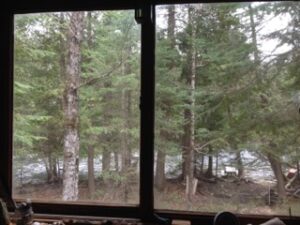 At times I imagine remaining in one rooted writing space, where I lounge in a comfy chair, perhaps breathing deeply, surrounded by precious and curated objects, having orderly thoughts and writing them down. But for whatever reason, my writing spaces change with my moods, and my moods are in motion.
At times I imagine remaining in one rooted writing space, where I lounge in a comfy chair, perhaps breathing deeply, surrounded by precious and curated objects, having orderly thoughts and writing them down. But for whatever reason, my writing spaces change with my moods, and my moods are in motion.
Photos courtesy of Kirsteen MacLeod.
Header photo by Debby Hudson on Unsplash
The 2019 Peter Hinchcliffe Short Fiction Award Longlist
Thank you to all of our 2019 Peter Hinchcliffe Short Fiction Contest entrants. There was a strong crop of stories this year that pushed the boundaries of tradition. We were struck by the deep complexity of each entry. After thoughtful deliberation, we are proud to announce this year’s longlisted writers and their exceptional stories.
2019 Peter Hinchcliffe Short Fiction Award Contest Longlist
♦ “Bundle of Joy” by Lisa Alward
♦ “He of the Holy Birth” by Jennifer Batler
♦ “The Underside of a Wing” by Paola Ferrante
♦ “Dakhma” by Dean Gessie
♦ “Miss Khokar Goes to Killbear” by Caitlin Hewitt-White
♦ “Touched” by Anna-Marie Larsen
♦ “Visiting Hours are from 5 to 7” by Erin MacNair
♦ “After Walter” by Chris Masterman
♦ “You’re Just Like Me” by Candice May
♦ “Opener” by Kristen Swan Morrison
♦ “Amphibios” by Andrea L. Mozarowski
♦ “Under the Meadow” by Tatiana Peet
♦ “The Pacific” by Justin F. Ridgeway
♦ “Mandala” by Anji Samarasekera
♦ “This is about running in Jerusalem” by Sivan Slapak
Stay tuned…
We will announce the contest finalists on Wednesday, August 28, 2019!
Launched: The Art of Leaving by Ayelet Tsabari
Welcome to the latest instalment of Launched, the series with the scoop on new books by Canadian authors.
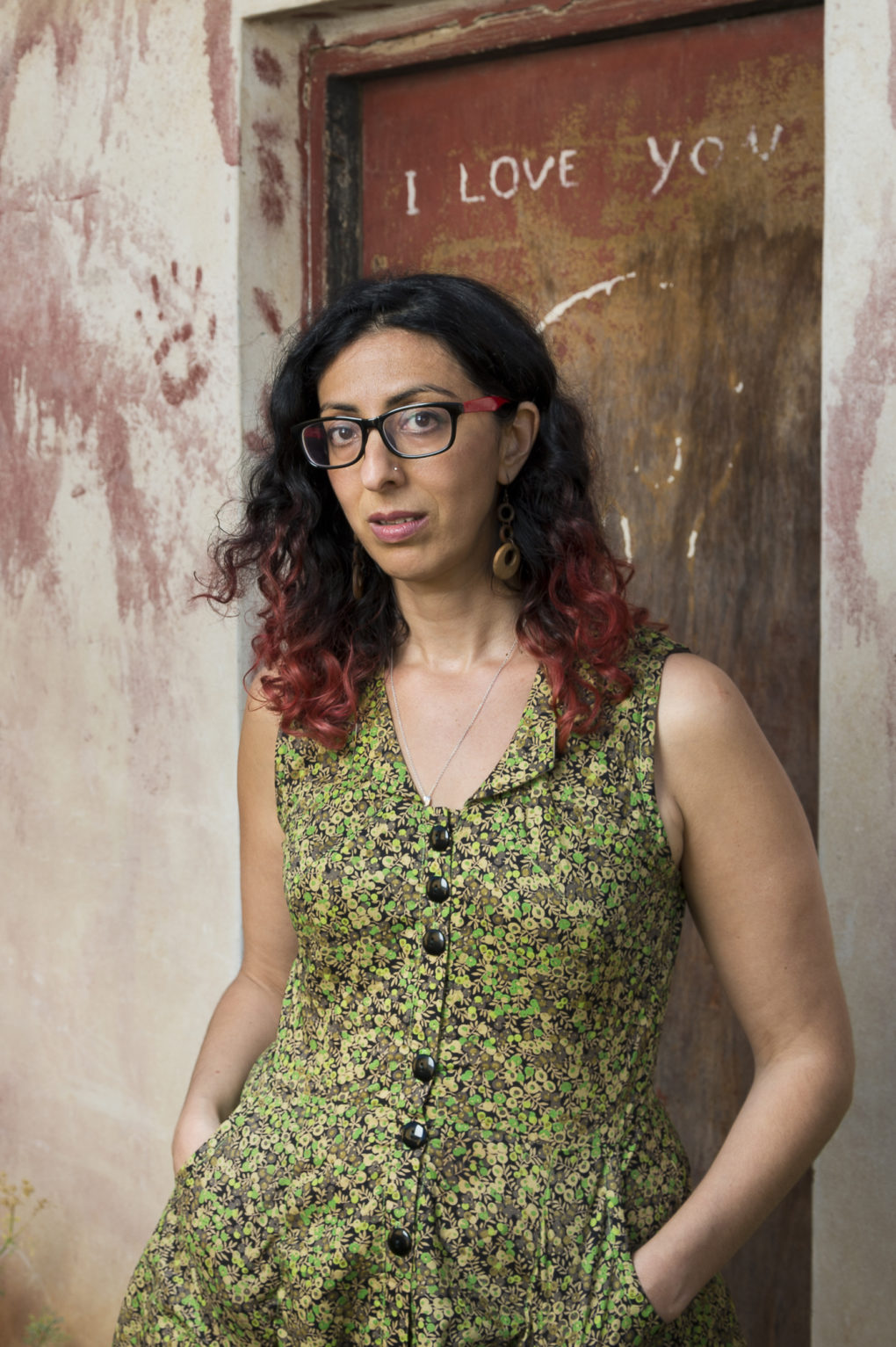 Ayelet Tsabari’s second book, The Art of Leaving, was published earlier this year by Harper Collins. Tsabari is the author of the story collection The Best Place on Earth, which won the Sami Rohr Prize for Jewish Literature and the Edward Lewis Wallant Award. The book was a New York Times Book Review Editors’ Choice, Kirkus Review’s Best Debut Fiction of 2016, was nominated for The Frank O’Connor International Short Story Award, and has been published internationally to great acclaim. Excerpts from The Art of Leaving have won a National Magazine Award and a Western Magazine Award. In 2014, she was awarded a Chalmers Arts Fellowship by the Ontario Arts Council.
Ayelet Tsabari’s second book, The Art of Leaving, was published earlier this year by Harper Collins. Tsabari is the author of the story collection The Best Place on Earth, which won the Sami Rohr Prize for Jewish Literature and the Edward Lewis Wallant Award. The book was a New York Times Book Review Editors’ Choice, Kirkus Review’s Best Debut Fiction of 2016, was nominated for The Frank O’Connor International Short Story Award, and has been published internationally to great acclaim. Excerpts from The Art of Leaving have won a National Magazine Award and a Western Magazine Award. In 2014, she was awarded a Chalmers Arts Fellowship by the Ontario Arts Council.
Q: Your first book was a short story collection, and The Art of Leaving is a memoir in essays. Some of the essays were previously published in literary journals and anthologies—including “Soldiers”, which first appeared in The New Quarterly. In the acknowledgements, you mention that it took 12 years from when you first began writing the stories from your life until they became a memoir. I’m interested in how you conceived of the book’s ultimate shape, and whether that process was different for essays than it was for your story collection.
I started writing and publishing essays in 2007. I never conceived writing a full-length memoir, because I didn’t think of my life in those terms. The narrative structure felt artificial to me. That’s not how real life works. But I knew I had stories to tell and ideas I wanted to explore, so I started writing essays, one at a time. At some point, it was becoming clear that this could be a book. But something was still missing from it, maybe I needed more distance from certain events to be able to write about them, or maybe I needed some events, like becoming a mother, to actually occur before the book could be completed. That’s why it took me so long. That, and the fact that I wrote my first book—The Best Place on Earth—during that time, too. Once I felt like I had enough essays to compile, I put them together in a somewhat chronological order and tried seeing the book as a whole for the first time: what’s missing, what doesn’t fit, what needs to be established earlier on, what warrants a repetition, etc. Having editors at this part of the process was crucial; they saw big holes in the narrative I couldn’t see for myself and certain thematic threads that were running through the book and needed to be introduced earlier on. 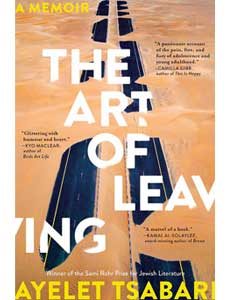
Q: How does it feel to have this intensely personal, wide-ranging, nuanced and—I’ll say it, riveting—book in the hands of readers? What reactions have you had thus far?
Thank you! It’s been an emotional experience. I knew it would be, but you can’t really know how it would feel until it happens. The reactions ranged widely. I’d been blessed by lovely, thoughtful reviews and had people contact me to tell me how much the book resonated with them, and that’s the best feeling. But I’ve also read some hurtful comments (authors should never read Goodreads reviews) like the one where the reviewer commented that my dad (who died when I was nine) was boring. There were people commenting on the story as difficult or too hard to read, which surprised me. I’ve read reviews that passed judgements on the character, which is, of course, a literary representation of my younger self. It can be hard sometimes not to take it personally. Other times it can be amusing. There was one blogger, who loved the book and wrote a kind review, but who called some of my life choices “questionable at best and downright stupid at worst.” I thought that was hilarious. Also, true.
Q: Literary (and Goodreads) criticism or praise aside, how do you think about and deal with the idea of exposure? As a reader, I often feel like I “know” the writer after finishing a memoir, but it’s a false intimacy. And yet, the best CNF makes us feel the writer’s experiences.
It’s an interesting conundrum. As a writer I want you to feel that way. This is a part of the illusion inherent in the genre, the non-fictional dream, if you will. As a person in the world, it can be disconcerting at times to encounter that misconception. But I don’t truly feel exposed. I know the story I tell in my memoir and the characters I create are carefully curated. I chose what to include and what to leave out for the sake of the story (and, at times, for the sake of privacy—mine and others’). I’m a writer. I’m in the business of making art and beautiful things. I’m in the business of story and making meaning out of my experiences.
Q: Navigating languages—native tongue and mother tongue, and your choice to write in English—is a thread running through the book, connecting the myriad ways in which language reflects cultures, values, and perceptions. You write: “English was a place I fled to, an act of reinvention…” It seems like an impossible task, to achieve such mastery of another language. Did you consider continuing to write in Hebrew and having your work translated?
I did start out writing in Hebrew, and I tried translating my work. But translation, while it is a marvelous gift to readers and an amazing skill, always loses something. It is inherent in the act. I’ve had my work translated from Hebrew to English and from English to Hebrew by others, and I’m grateful that I could be involved in that so I could see the places where translation failed, when it changed my voice and even the meaning. But also, by the time I started writing in English I wasn’t using Hebrew in my daily life, so writing in Hebrew didn’t come as naturally to me, either. Language is dynamic. For a language to be alive you need to use it and be surrounded by it, and during those years I no longer was.
Q: Will the book be published in Israel?
For the time being, I’ve decided to hold off on publishing the book in Hebrew. Which stands at odds with my previous statement about not feeling truly exposed, I guess! Somehow, I still feel hesitant about the book being out in the world in my mother tongue, where it can be read by my mom.
Q: What’s next? What are you working on now?
I’m working on a novel, which I find difficult and challenging and exciting. That’s all I can say about it at the moment.
Laura Rock Gaughan is the author of Motherish, a short story collection published in 2018. She lives in Lakefield, Ontario with her family.

